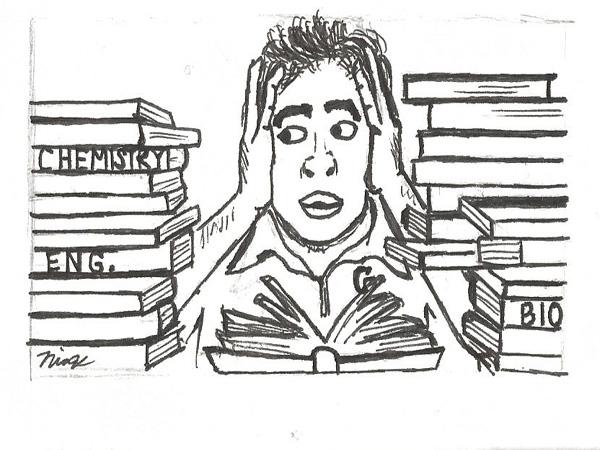It’s that time of year again. If you walk through the halls of any building at Cathedral, chances are you will hear someone stressing about the upcoming week of finals. Luckily, Ms. Valerie Charat and the learning center are here to offer some helpful tips about how to survive this dreaded week.
According to a very helpful handout, “Preparing for Finals”, compiled by the learning center and found on Ms. Charat’s website, it is best to start studying for finals as early as possible.
Staying Focused:
If you are a student who has trouble staying focused and on task, try making small goals for yourself, suggested Ms. Charat. Tell yourself that you will study 15 minutes of Science, then 15 minutes of English, 15 minutes of math, and then a short break. “Smaller and more specific goals are often easier to accomplish,” said Ms. Charat.
Where you study can also make a difference. Make sure you have a predetermined area to study each day that is quiet and calm. Do not study on your bed, in front of the T.V, or in a room where you will be easily distracted. Make sure that you turn your cell phone off or at least put it in a different room.
Some people like to listen to music while they study. But Ms. Charat said that if you are going to listen to music, make sure it is without lyrics. Also, it should be at a low volume and preferably not in headphones.
Staying Organized:
The finals handout suggests making lists. Make a list of topics you need to review in each subject, a list of study guides that you need to get from each teacher, and a list of materials that you need to successfully study each subject. This will help keep you organized and ensure that you don’t forget anything. Plus, the feeling of crossing things out is more satisfying than it seems.
While you are reviewing certain subjects, have a sheet of paper near by so that you can write down any questions that you have. This will help you know what to study and review and what you should ask your teachers before your final.
Taking Breaks:
“Breaks give the brain a chance to process material, which helps with information retention,” said Ms. Charat. It is very important to take breaks while your are studying but not so much that your break time is more than your study time. “An easy rule to remember is a 15 minute break for every 45 minutes you study,” she said.
Studying
Different subjects take different methods of studying. For example, for History make timelines, outlines, and flashcards. But for Math, don’t just leaf through the pages. Go to the chapter tests and work out the problems. Make flashcards for theorems and formulas.
According to the handout on Ms. Charat’s site, reading, reciting, reviewing, and writing help you to retain information. After reading a section of History, for example, recite what you have just learned. If you can’t do that, than you know you need to go back and reread.
Ms. Charat offered some helpful websites for studying. And not even one of them was Facebook. She said that khanacademy.org and quizlet.com were very helpful. But the most helpful resource is your teacher.
Taking the Test
When the time comes to take your final, don’t panic. If you were diligent and efficient in studying, know that you have done everything you could to prepare and that you could not have done anything differently. Once the test is over, don’t think about what you could have missed, or how many B’s you got in a row, or how you might have possibly forgotten to write your name, just move on to your next final and know that you are one test closer to Christmas break.
The stress of finals can be eased by a carefully planned out study schedule and a diligent work ethic. Make sure you get a good night’s sleep and eat a good breakfast the morning before. Being prepared is your best way of acing the finals. Studying can’t be done in just one night. In the words of Ms. Charat, “Studying for exams is more like running a marathon than a sprint,”.





















































